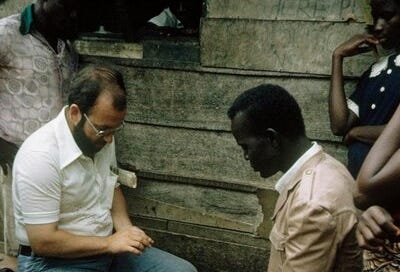The Memory Bank: Money in an Unequal World
The Memory Bank: Money in an Unequal World (2000; London: Profile Books, out of print) is posted online at Academia.edu, Google Books and other online sources. Used copies of Money in an Unequal World: Keith Hart and his memory bank (2001) are available at Abebooks and other commercial platforms.
The focus in this book is the Internet, which the author agrees holds the potential for a re-personalization of economic relations. In this world, new means of exchange could be harnessed to the ends of a truer economic democracy. Money is the problem, but it is also the solution. The author offers his view on the interaction between money, capitalism and culture - now, in the future, and throughout history. This work is designed to challenge established views from all quarters of economic, political and social thought. "The Memory Bank" is money itself - especially now that the exchange of objects through money and the exchange of meanings through language are converging into a single network of communications. Money is becoming information and information is becoming money. In this world, the author reveals how new means of exchange can be harnessed to build a better future.
TABLE OF CONTENTS
Prologue: Alvin
Chapter 1 MONEY IN THE MAKING OF HUMANITY: a. On money, machines, and the market; b. At home in the world; c. Reading The Memory Bank.
Chapter 2 THE MACHINE REVOLUTION TODAY: i. A civilization built on machines; ii. Mechanization in the long run; iii. Origins of the communications revolution; iv. The birth of the internet; v. Between agrarian civilization and the machine revolution.
Chapter 3 CAPITALISM, MAKING MONEY WITH MONEY: i. The age of money; ii. The theory of capitalism; iii. The ongoing origins of capitalism; iv. The personal face of capitalism, entrepreneurs.
Chapter 4 CAPITALISM, THE POLITICAL ECONOMY OF DEVELOPMENT: i. The twentieth century; ii. The development of global inequality; iii. State capitalism and the informal economy; iv. Virtual capitalism.
Chapter 5 MARKETS FROM A HUMANIST POINT OF VIEW: i. The market, private property and liberal democracy; ii. The anthropological critique of economic individualism; iii. Market relations in time and space; iv. The moral economy of paid and unpaid labour; v. Changing economic relations between men and women; f. Beyond wage slavery?
Chapter 6 THE CHANGING CHARACTER OF MONEY: i. History of the money form; ii. Heads or tails? Two sides of the coin; iii. The meaning of money; iv. Money, whence it came and whither it went v. Money in the age of the internet.
Chapter 7 THE FUTURE OF MONEY AND MARKETS: i. Making money, making scenarios; ii. The old regime and the middle-class revolution; iii. People’s money: beyond economic coercion; d#iv. Building monetary infrastructure in the 21st century.



